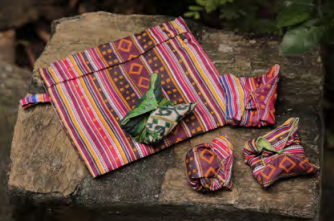Around the globe, more than 800 million women menstruate every day and at least five hundred million of those lack adequate resources, including supplies, education and facilities for managing their periods. Practical consequences of the societal and cultural stigma can be astonishing: worldwide, girls often skip and abandon school since they cannot attend school during menstruation days; in the poorest countries, less than half of all schools and public places have working toilets and half of them have running water, that means no proper places and disposal bins to change the menstrual pads. The lack of toilets intensifies a related hygiene problem, the worldwide misconception that bathing while menstruating can lead to various diseases and infertility. Most women are lacking in education about menstruation, believing it's a disease when the first menarche arrives. Other issues not to be forgotten may be the transactional sex to buy goods such as sanitary products and rituals that exile girls from society during menstruation (i.e. chaupadi, Nepal).

Such rooted stigma marginalizes menstruation and, through the fragility of women's health and safety, enhances the conditions of poverty while diminishing their life opportunities.
The aim of Lua Pad Project is to tackle period poverty and menstrual health management while raising awareness of those issues with women that have accessibility to products and facilities and diminishing waste production by single use pads in all segments of society.
The first country addressed is Philippines, in particular the indigenous women of the Mangyan minority of the island of Mindoro and one tribe in Palawan. Mangyan communities live in remote areas, especially on the mountains, and are mostly sustaining themselves as hunter gatherers. Interviews and research have been conducted in the villages, pointing out that menstruations were always followed by stigma and lack of hygiene. Superstitions about the period are such that a menstruating woman is believed to make vegetable rot by her simple touch, that the man that will put his lap on her legs would become bold, and that she is not allowed to wash herself for the whole week. Women spend all their time at home, mostly in their beds, in the discomfort of not being able to protect themselves, with two or more trousers. They avoid doing the chores for the whole week, letting the men take care of the family.
Due to lack of money and physical remoteness, women mostly use makeshift materials like leaves, rice bags and fabric scraps to absorb the menstrual blood, and when they can afford the plastic pads they use each pad for 24 hours, both methods causing infections and discomfort. In the latter case the used pads, instead of being burnt – as it is habit for these communities for the majority of plastic waste - are buried under the ground of the forest due to menstrual taboos, polluting ground and ground-water.
Besides, family men manage the money for the menstrual products and oblige women and girls to avoid touching water or grow and sell vegetables for the duration of their period. Many women and girls confess hiding their menstruations in order to be able to conduct a normal life.
The Lua rewashable sanitary pads are a pragmatic solution for all the women in need and have been prototyped with various materials, from anti leak material coming from used umbrellas to used cotton t-shirts. Prototypes have been enhanced during time through a trial-error process made possible by the feedback and inputs of the women and girls of the villages.
The reduction of menstruation waste brings to environmental sustainability, moving up in the waste management hierarchy: on average a woman uses 16.000 pads in her entire life, approximately the amount of 150 kg of plastic.
A core aspect of the project is furthermore its social sustainability: reducing period poverty and the accessibility to menstruation products and enhancing the menstruation health management by raising awareness and promoting education during gatherings and conversations with women and girls of the villages.
The project has been approved by the National Commission of Indigenous People (NCIP), the agency of the national government of the Philippines that is responsible for protecting the rights of the indigenous peoples of the Philippines, that didn't see any harm in the objective and the implications of the project's donation.
Lua is now present in Philippines and Colombia and the long-term target is for its rawashable sanitary pads to be sold worldwide to all women who can afford their cost, and with such proceeds produce and donate the same quantity of the pads sold to women in need.
LuaPad Project was initiated by Anna Orlando, Italian architect and building engineer, and Cindy Suaza, Colombian Doctor in political science specialized in gender equity, and with the precious support of Melody Ledesma, a brilliant local of Puerto Galera. The project has been developed during the COVID-19 pandemic in Mindoro island where they were living since before the lockdown and working on WASH projects for remote elementary schools of the native communities, as well as coordinating COVID-19 masks donation and food donations.